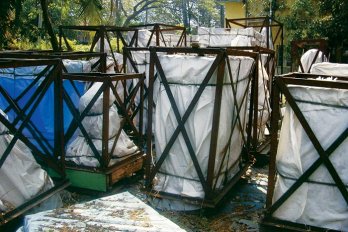Zagreb—Eight years after the brutal wars between Yugoslavia’s republics came to an end, most of the countries that once made up the federation remain dysfunctional. Croatia, however, is the exception. The economy has picked up. Tourists are returning to the spectacular Dalmatian beaches. And Croatia’s excellent wines once more grace the tables of the country’s first-rate restaurants.
Croatia, in fact, seemed to have successfully put its past behind it, until the crowd ran amok at the European Water Polo Championship in June, and revealed the deep ethnic rifts that remain beneath Croatia’s cool veneer.
It happened after Serbia-Montenegro’s overtime victory over arch-rival Croatia. While Serbs cheered, and Serbia’s foreign minister jumped triumphantly into the pool, Croat fans went berserk. They attacked Serb delegates and sports announcers in the vip area, trashed the stadium, and set the Serbian flag on fire while chanting, “Kill the Serbs.” A Croat player pleaded with them to stop, but the fans went after him as well. Police used tear gas to quell the frenzy, and the medals had to be handed out in a secluded corner of the Slovenian arena.
If it had been a sport more central to the national consciousness—like football, say—then perhaps the incident would have been less startling. But the outrageous behaviour of sports fans following a game that most Croatians know (and, presumably, care) little about was a harsh betrayal of Croatia’s sophisticated self-image.
No one was seriously hurt; the greatest damage was to Croatia’s reputation. The riot was cited in local and international news as the worst incidence of Serb-Croat violence in years. Croatia’s prime minister, Ivica Racan, publicly reprimanded the fans, telling the Croat team, “You represented Croatia wonderfully, unlike those vandals, who shamed Croatia.” But many Croats worry that it was more than an isolated act of vandalism. The riot was reminiscent of the dying days of the Yugoslav federation, when Serb-Croat sports matches became all-out battlegrounds between rival fans. The violent hysteria of those games was a harbinger of the vicious war to come. The question now being debated in the salons and coffee bars of Croatia is: What does the water-polo incident portend for the future?
“There are two Croatias,” says Mladen Mali, a journalist based in the capital city, Zagreb. “There is the Croatia that is totally ashamed of the water-polo riot. And the Croatia that is celebrating it.” Sporting events have long been an informal recruitment centre for Croat extremists. In pre-war times, the right-wing Croatian Democratic Union (HDZ) used the charged atmosphere of sporting events to stir up raw, nationalistic fervour, which, thanks to TV coverage, would be transmitted to a wide audience.
The water-polo game, says Mali, revealed that nationalist passion is still a potent political force. Elections are looming, and Croatia’s liberals, like Mali, fear the worst: that emotions like those displayed at the water-polo match will be amplified as they were in the early 1990s, and the ultra-conservatives will return to power.
In the elections of 2000, the year following the death of the ultra-nationalist autocratic leader, Franjo Tudjman, moderate Croatia prevailed, electing a coalition of reformists to the Sabor (Croatia’s parliament). Tudjman’s HDZ party went off to lick its wounds. The new government—delicately balancing the interests of its coalition members—preoccupied itself with mending relations with the other former Yugoslav republics and bringing Croatia into the European Union.
Croatia has always had aspirations to be more than a back-lot Balkan enclave. The tribal peasant culture that clings perniciously to many parts of the former Yugoslavia is a source of embarrassment for Croats, who deny they share it. In conversation, most Croats will pull you up short if you refer to them as Balkan people, or Catholic Slavs. “Please,” they say, “we’re Europeans.” It’s a designation they won’t generally assign to other former members of the Yugoslav federation.
It’s true that nationalism is generally more muted here than in many parts of the former Yugoslavia, but it is nonetheless in the Croat psyche. Nationalist fervour has been a part of Croatia’s political culture since the Nineteenth Century, disappearing from view only during the years of Communist Yugoslavia when ethnic nationalism was suppressed. It seemed to have subsided after the last elections. And it was easy to forget about it entirely as the espresso machines steamed away in Zagreb’s urbane cafés. But as the water-polo riot showed, behind that veil of continental civility, the tribal Croatia has survived, intact.
Last year, when The Hague charged national hero General Janko Bobetko with war crimes during the war of independence, the coalition government of Prime Minister Racan nearly collapsed. Croat nationalism resurfaced in a popular wave of support for Bobetko and the Croatian armed forces. The government tried to avoid a showdown with both the country’s right wing and The Hague, without denying the charges. The eighty-four-year-old general had the good grace to die before anyone had to deal with the main substance of the indictment against him: a hundred Serb civilians murdered in the course of a few days by the soldiers under his command.
The EU recently presented Croatia with a list of 2,500 niggling little questions, including queries about its human-rights record, its media restrictions, and, not insignificantly, what it plans to do about the Serbian refugees who want to return home or at least recover some of their property. The Hague wants to know when Croatia plans to turn over another general, the notorious Ante Gotovina, charged with masterminding an ethnic-cleansing sweep of Serbs in the final months of the war. These are the issues holding up Croatia’s entry into the lucrative EU club, a distinction seventy-five percent of Croatians want.
To its credit, Croatia has turned over other Hague indictees and has vowed support for the war-crimes tribunal. And Croatia has a better record for allowing refugees to return than Bosnia, for example. But such progress is threatened in the pending election.
Following the water-polo fracas, the Sabor drafted legislation governing behaviour at sports matches that includes provisions designed to keep fans in line and strict punishments for those who misbehave. That attempt to mute the extremists, however, might backfire: Right-wing agitators are again active in the country’s sports arenas where fans have declared they plan to defy the new law.
Croatian intellectuals have called on their fellow citizens to recognize that they have a history of nationalist intolerance and to confront their misdeeds in the war. But it’s doubtful the Croat public will respond sympathetically. The coffee is good. The beaches are full. And perhaps sports hooliganism and nationalistic chest-thumping would give them just that much more in common with the rest of Europe.
This appeared in the October 2003 issue.




